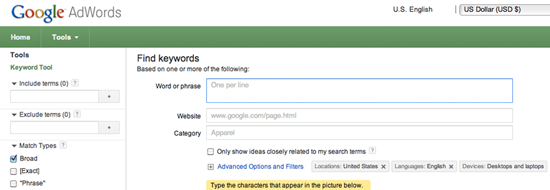 The size of the web is expansive. You may have an innovative site with great content, but how do you stand out among billions of other web sites? The indexed web (the amount of the web that has been browsed by crawlers - more on this later) contains at least 4.12 billion pages as of September 23, 2013 (World Wide Web Size). If you want your site to be noticed in this vast virtual world, consistently creating valuable content surrounding a topic is the first and most important step - but to achieve the best possible results, you will need to know a bit about search engine optimization.
The size of the web is expansive. You may have an innovative site with great content, but how do you stand out among billions of other web sites? The indexed web (the amount of the web that has been browsed by crawlers - more on this later) contains at least 4.12 billion pages as of September 23, 2013 (World Wide Web Size). If you want your site to be noticed in this vast virtual world, consistently creating valuable content surrounding a topic is the first and most important step - but to achieve the best possible results, you will need to know a bit about search engine optimization.
73% of all internet users in America use search engines and 91% of those search engine users claim that they almost always find what they are searching for (Pew Internet & American Life Project). According to a study done by Optify, the first three organic search results on the first result page from a user query get 58.4% of all clicks from users (Study from Optify). In other words, most people use search engines to find what they are looking for and a majority of those people don’t click on anything past the third result they see, let alone the first page.
Search engine optimization (SEO) is becoming increasingly important because using a search engine is a powerful way for a user to make sense of the billions of sites that make up the web. If your website is not showing up as a search engine result even though it is the perfect answer to a user’s query, how are people going to know that your site is relevant to them?
Your website should definitely speak for itself but if search engines can’t see or fully understand your content, then you will have a hard time attracting organic traffic. For this you need to know a little bit about SEO relevance and reputation.
RELEVANCE & KEYWORDS
Relevance can be gained simply by making good keyword-related content. A keyword is any word or phrase that indicates the content or topic of a website or webpage. “The more a keyword is used by searchers and websites the more attraction power it has.” (Google Keyword Planner) Relevant keywords make it possible for users to find your site through search engines.

Search engines send out crawlers which systematically scour the web to identify and index the keywords and content that best represent web pages and may be relevant to a myriad of potential search queries. When a user enters a query into a search engine, the engine attempts to understand the purpose of the query and then provides the most relevant results. Search engines have become very adept at assessing and ranking the relevance of website content which has made search a fast and reliable way to navigate the internet - but also a competitive landscape for websites targeting the same keywords.
The more search engines are able to understand and provide relevant results for queries, the less time users spend paging through search engine results. As stated above, many users don’t look past the first page (and often the first three organic links) before clicking on a search result. As such, having prominent ranking in the search results for appropriate queries is essential to attracting organic traffic to your website.
So, what does this mean for you? Basically, keywords are really important! They should be in the title of your web page, in your headers, in your tags, and in your content. However, don’t get too crazy. Search engines have a process of indexing and returning related pages based on not only relevance but also reputation/authority. If you use way too many keywords in your site or you repeat them simply for the sake of increasing your search engine ranking (this is known as keyword stuffing) your site will surely be flagged as spam and your reputation as a credible site will disappear.
Ideally, each page on your website should focus on a single main topic. You can use headings to cover sub-topics as needed, but your page as a whole should serve a single purpose. If you have a very long page covering a number of varying topics, it is less likely that search engines would consider your page the most relevant for a given query.
The key to remember is that search engines evaluating websites for use by humans - not search engines. So, while you need to know what search engines are looking for, do not write content specifically for search engines - write your keyword-rich content for the people you want to visit your website.
REPUTATION & LINK ANALYSIS
 Keywords aren’t the only thing that search engines take into consideration when indexing web pages. Search engines perform link analysis - they gather the number of inbound (incoming) links for any given web page. The more inbound links that a web page has signifies it’s relevance and importance. The inbound links act as a vote of confidence in the underlying assumption that important pages will receive more inbound links. Google, in addition to searching the number of inbound links also determines their quality - that is their reputation. Thus, the more reputable a site that links to your site is, the more that inlink is worth and the higher it will bump your search engine ranking. Conversely, links from non-reputable sites can actually decrease your search engine ranking.
Keywords aren’t the only thing that search engines take into consideration when indexing web pages. Search engines perform link analysis - they gather the number of inbound (incoming) links for any given web page. The more inbound links that a web page has signifies it’s relevance and importance. The inbound links act as a vote of confidence in the underlying assumption that important pages will receive more inbound links. Google, in addition to searching the number of inbound links also determines their quality - that is their reputation. Thus, the more reputable a site that links to your site is, the more that inlink is worth and the higher it will bump your search engine ranking. Conversely, links from non-reputable sites can actually decrease your search engine ranking.
Reliability and reputation are important parts of search engine rankings because they are ways of combating spam. Spammers have been known to create link farms - groups of sites that all link to each other simply for the purpose of boosting page rankings. This is where reputation becomes important because it determines how relevant your inbound links are to the actual content of your site.
An effective way to gain relevant and reputable inbound links is to ask any credible source such as a client, company, boss, professor, school, colleague, etc. to link to your site using the same or similar keywords that you use in your site.
Keywords embedded in the anchor text of links to your site are also incredibly helpful. They let the search engine know that other reputable sites are acknowledging and recommending your site for a specific reason.
What about search engine marketing and other advertising methods?
It’s true. There are numerous ways of getting visitors to your website. Direct traffic (people who come directly to your site), search engine marketing (SEM), pay-per-click (PPC) advertising, pay-per-impression (PPI) advertising, social media marketing, email marketing, and terrestrial marketing can all contribute to your overall website traffic.
Search Engine Optimisation is one more tool in your arsenal, but it is unique in that it can be integrated into your other advertising methods. For example:
- Search Engine Marketing
- Social Media Marketing
- Terrestrial Marketing
In Summary
Your website is great - but you need to understand search engine optimization in order to maximize relevant traffic to your website. Start by creating valuable content written for humans and related to the purpose of your website. Be sure to include relevant keywords in key locations on your pages - but don’t stuff keywords unnecessarily. Pair your SEO efforts with your other marketing techniques to help build reputable links and promote consistency across your online properties. Note that content creation and SEO are ongoing processes - so keep doing what works. Continue creating relevant and useful content optimized for search engines - your search engine traffic will thank you.
we can help plan and execute a strategy to achieve your goals.



.jpg)
